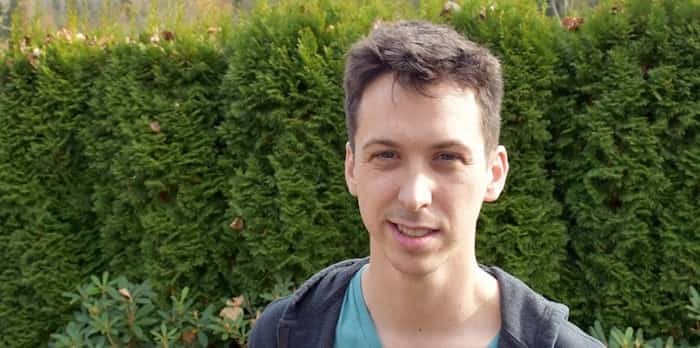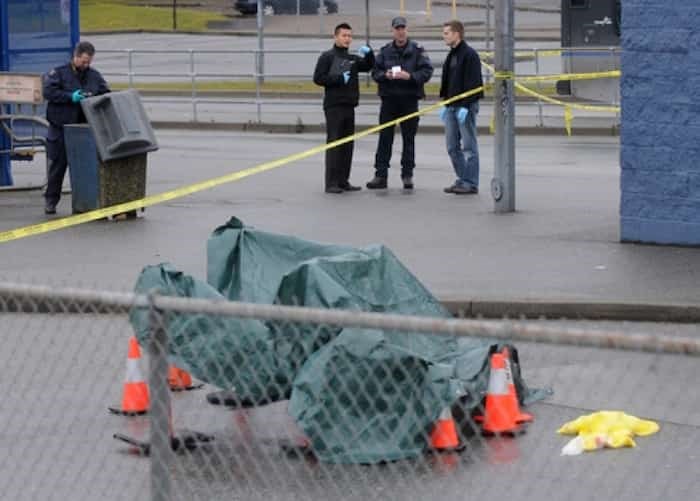 Cody Bechler-Cardiff is still dealing with the effects of a random stabbing in December 2011 at Coquitlam Central Station. Photograph By Gary Mckenna
Cody Bechler-Cardiff is still dealing with the effects of a random stabbing in December 2011 at Coquitlam Central Station. Photograph By Gary Mckenna
Cody Bechler-Cardiff was just trying to get home.
It was a cold night in December 2011 and the then-19-year-old, an avid transit user, was about to board the 701 bus, his last transfer on his way back to Maple Ridge.
As he went to check the schedule posted at his stop at Coquitlam Central Station bus loop, a man leaning against the wall of the brick utility room building asked if he wanted a cigarette.
“No thanks,” Bechler-Cardiff remembers responding after taking one of his headphones out of his ear. “Don’t smoke.”
Then, without warning, the stranger stepped in front of him, hit him in the face and jabbed him twice in the abdomen.
Winded and in shock, Bechler-Cardiff said he felt like he had received an uppercut to the stomach.
Then he saw the blood.
He had been stabbed multiple times, with one of the blows hitting him in the solar plexus, piercing his heart.
“It takes a second to realize,” he said during a recent interview in the living room of his Maple Ridge home. “You look down and it’s like ‘That’s not suppose to be there.’”
After calling out for help, he managed to get to the curb, where several people rushed to his aid and someone immediately phoned 911.
He remembers being loaded onto a stretcher and put in the ambulance. When he felt paramedics were not giving him a straight answer about how bad his injuries were, his mind began to race.
“In your head, you’re like, ‘That is probably not a good sign,’” he said.
Fifteen-minutes after the 911 call was made, Bechler-Cardiff was in Royal Columbian Hospital. Court papers later stated that the attending surgeon did not expect him to survive.
“If any of that played out any different, I can almost guarantee you I wouldn’t be here,” he told The Tri-City News. “They told me that they didn’t have high hopes I was going to make it through. I went into cardiac arrest a few times and it was super touch and go.”
 Cody Bechler-Cardiff was randomly attacked at the Coquitlam Central Station bus loop in 2011. Tyrel William Scott was recently sentenced to 11 years in prison for the incident. Photo: RCMP
Cody Bechler-Cardiff was randomly attacked at the Coquitlam Central Station bus loop in 2011. Tyrel William Scott was recently sentenced to 11 years in prison for the incident. Photo: RCMP
SIX LONG YEARS
Bechler-Cardiff has replayed the night in his head many times.
But earlier this month, the emotional wounds were re-opened for what he hopes is the last time when Tyrel William Scott received 11 years in prison for the attack.
In a psychiatric report, Scott stated he was using drugs at the time and went into “psycho mode” after a woman on the bus gave him what he perceived to be a dirty look.
Initially, the randomness of the incident made it difficult for police to determine a motive or identify a suspect.
In the days after the attack, officers asked Bechler-Cardiff if he was affiliated with any gangs and even posted a guard outside his hospital room door in case someone came back to hurt him. They wanted to know if he knew of anyone who may want to kill him, he said.
“I was like, ‘I think I’m a pretty personable guy,’” he remembers saying at the time. “As far as I know, most people like me.”
It was only after police released surveillance video of the suspect on the bus that Scott’s name surfaced. Still, investigators did not believe they had enough evidence to charge him.
As the years began to tick by — six of them — Bechler-Cardiff said he wondered if his attacker would ever be brought to justice. While police would periodically check in with him, he was under the impression the case had gone cold.
“Every time I asked, they would say it was an ongoing investigation,” he said, later adding: “I kind of had to come to terms with it myself that it was a possibility that he wouldn’t get caught.”
But in May 2017, court papers show, police began an undercover operation known as a “Mr. Big sting” with the intention of getting the suspect to admit to details of the crime. A month after the operation began, Scott made several statements to an undercover officer that led to his arrest.
Bechler-Cardiff said he was surprised to learn of the sting when details of the investigation came out in court.
“That was some TV movie kind of stuff,” he said, crediting police for their hard work and tenacity in pursuing their target.
But what was even more shocking was the fact that in the years after the attack, Scott lived only a few blocks from Bechler-Cardiff’s house. He said his mom even had friends who had gone to high school with the attacker.
“That was weird,” he said. “Who knows? I could have walked by him.”
THE SCARS
The attack has left both physical and emotional scars.
Before the incident, Bechler-Cardiff said he was an outgoing young man who enjoyed going to parties and spending time with his friends.
He took the bus everywhere, criss-crossing the region to school in Vancouver, where he studied music and sound engineering at the Pacific Audio Visual Institute, to his home in Maple Ridge. On the night of the attack, he was returning from a friend’s place in Surrey.
These days, the 26-year-old is somewhat comfortable on SkyTrain but mainly steers clear of public transit. He took the bus once after the attack, traveling only a stop or two, but it was more about overcoming his fear than actually getting somewhere, he said.
“I am two completely different people,” he said. “After that happened, I ended up being a lot more introverted. I never had anxiety or that kind of stuff before… I feel like I’m more of a reserved person.”
There are also the physical reminders.
On top of the multiple stab wounds, there are scars from the staples that held his abdomen together after surgery and holes where tubes went through him.
He also has a bone protruding from his chest that did not heal properly after his sternum was broken while paramedics administered CPR.
“It was basically survival mode,” said Alex Bechler-Cardiff, Cody’s wife. “They weren’t worried about what it was going to look like.”
He gets a lot of stares at the beach or the swimming pool and if anybody asks about it, “you can’t just say you were stabbed” and move on, he said.
“It’s a constant reminder,” he said. “But at the same time, I look at photos from before this happened… and it is hard to even recognize it is me. Now I am used to it.”
‘AFFECTS EVERYONE’
While the sentencing hearing has brought him some closure, Bechler-Cardiff said he remains angry about what happened and probably always will be. He is more vigilant when he is out in public and for a long time he avoided Coquitlam City Centre area.
But as time has passed, he said he has been able to process the incident and things have slowly returned to normal, thanks in large part to the support of his friends and family.
“It was a big support group,” he said. “It doesn’t just affect me. It affects my wife. It affects my family. It affects everyone that was around me.”
Now that the court process has finished and the perpetrator sentenced — something he often doubted over the years would ever happen — he said he is ready to move on with the next chapter of his life.
“After it all happened, I told myself this is going to go one of two ways: It is going to consume my life and everything is going to revolve around this, or I can figure out how to deal with it.”



